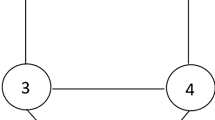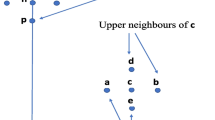Abstract
Parrondo’s paradox refers to the situation where two, multi-round games with a fixed winning criteria, both with probability greater than one-half for one player to win, are combined. Using a possibly biased coin to determine the rule to employ for each round, paradoxically, the previously losing player now wins the combined game with probability greater than one-half. In this paper, we will analyze classical observed, classical hidden, and quantum versions of a game that displays this paradox. The game we have utilized is simpler than games for which this behavior has been previously noted in the classical and quantum cases. We will show that in certain situations the paradox can occur to a greater degree in the quantum version than is possible in the classical versions.
Similar content being viewed by others
References
Feller W.: An Introduction to Probability Theory and its Applications. Wiley, New York (1950)
Flitney A.P., Ng J., Abbott D.: Quantum Parrondo’s games. Physica A. 314, 35–42 (2002)
Harmer G.P., Abbott D.: Parrondo’s paradox. Stat. Sci. 14(2), 206–213 (1999)
Jensen F.V.: Bayesian Networks and Decision Graphs (Statistics for Engineering and Information Science). Springer, New York (2001)
Kraus K.: States, Effects, and Operations: Fundamental Notions of Quantum Physics (Lecture Notes in Physics). Springer, Berlin (1983)
Lorenzo A.D.: Reassessment of Leggett inequality. Found. Phys. 43, 685–698 (2013)
Martin J.J.: Bayesian decision problem and Markov chains. Wiley, New York (1967)
Meyer, D.A.: Noisy quantum Parrondo game. Unpublished.
Norris J.R.: Markov Chains (Cambridge Series in Statistical and Probabilistic Mathematics). Cambridge University Press, Cambridge (1997)
Parrondo J., Dinis L.: Brownian motion and gambling: from ratchets to paradoxical games. Contemp. Phys. 64(2), 147–157 (2004)
Pejic, M.: Bayesian quantum networks with application to games displaying Parrondo’s paradox. (2015). http://arxiv.org/abs/1503.08868
Rao M.M.: Measure Theory and Integration. Wiley, New York (1987)
Royden, H.L.: Real Analysis, 3rd edn. Prentice Hall, Upper Saddle River (1988)
Seneta E.: Non-Negative Matrices and Markov Chains (Springer Series in Statistics). Springer, New York (2002)
Author information
Authors and Affiliations
Corresponding author
Rights and permissions
About this article
Cite this article
Grünbaum, F.A., Pejic, M. Maximal Parrondo’s Paradox for Classical and Quantum Markov Chains. Lett Math Phys 106, 251–267 (2016). https://doi.org/10.1007/s11005-015-0812-8
Received:
Revised:
Accepted:
Published:
Issue Date:
DOI: https://doi.org/10.1007/s11005-015-0812-8




